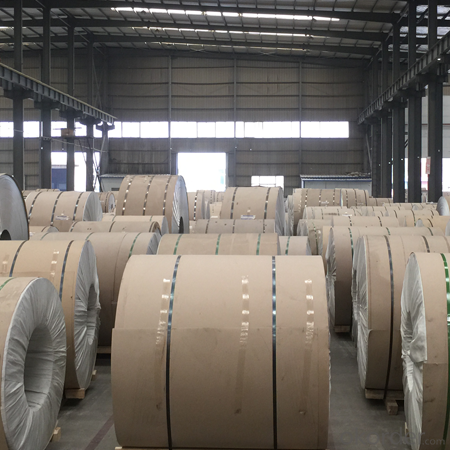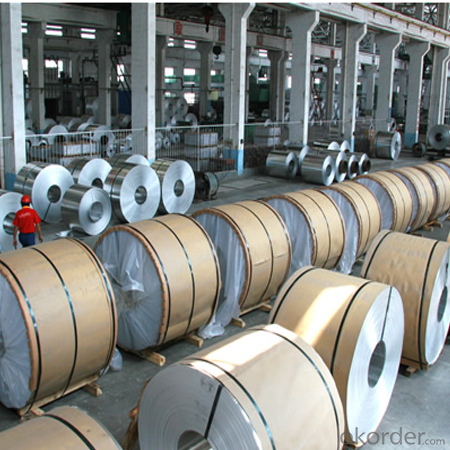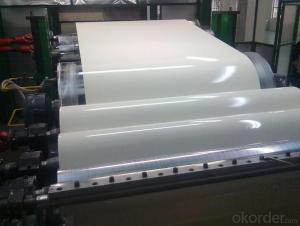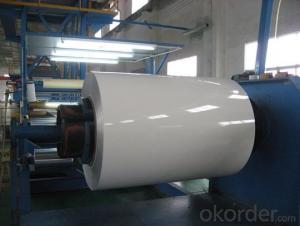Coated Aluminium Coil/Roll For Aluminium Ceiling Panel
- Loading Port:
- Shanghai
- Payment Terms:
- TT OR LC
- Min Order Qty:
- 2 m.t.
- Supply Capability:
- 50000 m.t./month
OKorder Service Pledge
OKorder Financial Service
You Might Also Like
Item specifice
Coated Aluminium Coil/Roll For Aluminium Ceiling Panel
Description
Alloy | 1060, 1100, 3003, 8011, etc. |
Temper | H16, H18, H24, H26, H28 |
Thickness | From 0.05mm to 3.0mm |
Width | Standard width:1240mm |
Special width:1300mm, 1520mm, 1570mm, 1595mm | |
Diameter | Standard dia:1200mm |
Interior dia:150mm,405mm,505mm | |
Weight | 2.5 T/coil,3.0 T/coil |
Coating | PE, PVDF, ACRYLIC |
Surface | Embossed, mill finish, coated |
Color | AS to code RAL |
Gloss | 10-90%(EN ISO-2813:1994) |
Coating Thickness | PE: more than 18 micron |
PVDF: more than 25 micron | |
Coating Hardness(pencil resistance) | More than 2h |
Coating adhesion | 5J (EN ISO-2409:1994) |
Impact Resistance | No peeling or cracking(50 kg/cm,ASTMD-2794:1993) |
Flexibility(T-bend) | 2T |
MEK resistance | More than 100 |
Advantage | 1.High temperature resistant 2.Weathering resistant 3.Scrubbing resistant 5.Acid or alkali proof 6. Fireproof 7.Light weight material is easy to construct and install |
Out package | Wooden splint with export standard |
Application | ACP, wall cladding, facades, roofs and canopies, ceilings, signboards, blind window, display platforms, electrical panels, etc |


Manufacturing
Decoiler → Accumulator →Tension Leveler →Acid & Alkali Cleaner → Rinse →Conversion Treatment → Priming coater →Infrared Curing Oven →Main coater →Floatation Curing Oven →Strippable Film Applicator → Exit Accumulator → Recoiler
FAQ
--Q: Do you provide free samples?
--A: Yes, free samples will be sent to you on freight at destination.
--Q: Can I get your latest products catalogue?
--A: Yes, it will be sent to you in no time.
--Q: What is the MOQ?
--A: 2 tons
--Q: What are your payment terms?
--A: We accept L/C, T/T.
--Q: What kinds of alloy can you supply?
--A: 1000 series: 1050, 1060, 1070, 1100, 1145, 1200
3000 series: 3003, 3004, 3105, 3104
5000 series: 5052, 5083, 5754, 5182
6000 series: 6061, 6063, 6062, 6063
8000 series: 8011, 8021
--Q: What kinds of temper can you supply?
--A: O-H112: O,H12,H14,H16,H18,H22,H24,H26,H,32,H34,H111,H112
T3, T4, T6
- Q:Are aluminum coils suitable for decorative applications?
- Yes, aluminum coils are suitable for decorative applications. Aluminum is a versatile and lightweight material that offers excellent corrosion resistance, making it an ideal choice for decorative purposes. It can be easily shaped, formed, and fabricated into various designs, patterns, and finishes, allowing for endless possibilities in decorative applications. Additionally, aluminum coils can be coated with different colors and finishes, such as anodized or painted, to enhance their aesthetic appeal and durability. Whether it's for interior or exterior decoration, aluminum coils provide a cost-effective and visually appealing solution.
- Q:Can aluminum coils be used in pharmaceutical manufacturing?
- Yes, aluminum coils can be used in pharmaceutical manufacturing. Aluminum is commonly used in the pharmaceutical industry for various purposes, including packaging and manufacturing equipment. Aluminum coils can be used to make containers, caps, and closures for pharmaceutical products. These coils are often used in the production of blister packs, which are widely used for packaging tablets and capsules. Aluminum is preferred in pharmaceutical manufacturing due to its excellent barrier properties, resistance to corrosion, and ability to protect the integrity of the pharmaceutical products. Additionally, aluminum is lightweight, recyclable, and has a low melting point, making it a versatile and cost-effective choice for pharmaceutical manufacturing.
- Q:Are aluminum coils fire-resistant?
- Aluminum coils possess fire-resistant qualities due to their high melting point of 660 degrees Celsius (1220 degrees Fahrenheit) and their inability to burn, rendering them non-combustible. This specific characteristic allows for the utilization of aluminum coils in various applications, particularly in sectors where fire resistance is of utmost importance, such as building construction, electrical wiring, and HVAC systems. Moreover, the remarkable heat conductivity of aluminum facilitates rapid heat dissipation, thereby minimizing the risk of fire incidents. Nevertheless, it is crucial to acknowledge that although aluminum coils themselves exhibit fire-resistant properties, they may be incorporated into systems alongside other components that might not share the same level of fire resistance. Consequently, it is essential to consider the entirety of the system and adhere to proper fire safety regulations and guidelines to ensure comprehensive fire safety precautions.
- Q:What is the typical hardness of aluminum coils?
- The hardness of aluminum coils can vary depending on different factors, such as the composition of the alloy, the process of tempering, and the intended use. Manufacturers produce aluminum coils with different levels of hardness to meet various needs and requirements. Aluminum coils are available in different tempers, including soft, half-hard, and full-hard. Soft aluminum coils have low hardness and are highly malleable, making them suitable for applications that require easy shaping, such as packaging and wrapping materials. Half-hard aluminum coils are moderately hardened and offer a balance between formability and strength, making them suitable for applications like roofing and siding. Full-hard aluminum coils have the highest hardness and provide excellent strength, making them ideal for applications that require structural integrity, such as automotive parts and construction materials. To determine the specific hardness of aluminum coils, various testing methods can be used, such as Rockwell hardness, Vickers hardness, or Brinell hardness. These tests measure the resistance of the aluminum surface to indentation and provide a numerical value indicating the material's hardness. However, it is important to consult the manufacturer or supplier for the specific hardness values, as they can vary depending on the specific alloy and temper of the aluminum coil.
- Q:What is the tensile strength of aluminum coils?
- The tensile strength of aluminum coils can vary depending on the specific alloy and temper used. However, on average, aluminum coils have a tensile strength ranging from 150 to 300 megapascals (MPa). This means that aluminum coils can withstand a pulling force of 150 to 300 MPa before breaking or deforming. It is important to note that the tensile strength may be influenced by factors such as the thickness of the coil, the manufacturing process, and any additional treatments or coatings applied to the aluminum.
- Q:How do aluminum coils perform in saltwater environments?
- Due to their innate resistance to corrosion, aluminum coils exhibit exceptional performance in saltwater environments. Unlike other metals, aluminum develops a protective oxide layer upon exposure to saltwater, effectively creating a barrier that prevents further corrosion. This durable and long-lasting oxide layer acts as a shield against the harsh effects of saltwater, guaranteeing the longevity and efficiency of aluminum coils in marine applications. Furthermore, the lightweight nature and high thermal conductivity of aluminum coils make them widely favored for use in heat exchangers and condensers within saltwater-based cooling systems. In conclusion, aluminum coils are extensively relied upon and highly efficient in saltwater environments, establishing them as the preferred choice for a range of marine applications.
- Q:How are aluminum coils made?
- Aluminum coils are made through a process called continuous casting and rolling. The process begins with the melting of aluminum ingots or scrap in a furnace. Once the molten aluminum reaches the desired temperature, it is transferred to a holding furnace. From there, the molten aluminum is continuously cast into a solidified strip, which is then fed through a series of rolling mills. The rolling mills apply pressure to the aluminum strip, reducing its thickness and increasing its length. This process is repeated multiple times until the desired thickness and width are achieved. During the rolling process, the aluminum strip is also cooled and lubricated to prevent it from sticking to the rollers and to enhance its surface finish. After rolling, the aluminum strip is coiled to form a continuous sheet of aluminum coil. The coils are typically wound tightly to minimize any air gaps and ensure stability during transportation and storage. At this stage, the coils can undergo additional processes such as annealing, where they are heated and slowly cooled to improve their mechanical properties and make them more suitable for specific applications. Overall, the production of aluminum coils involves a combination of melting, casting, rolling, and coiling processes, all aimed at producing high-quality coils with the desired dimensions and properties.
- Q:Can aluminum coils be used in the manufacturing of medical devices?
- Yes, aluminum coils can be used in the manufacturing of medical devices. Aluminum is a versatile material that offers several advantages for medical device manufacturing. It is lightweight, corrosion-resistant, and has good thermal conductivity. These properties make aluminum coils suitable for various medical applications such as medical imaging equipment, surgical instruments, and prosthetics. Medical imaging devices, such as MRI and CT scanners, often use aluminum coils to transmit and receive electromagnetic signals. Aluminum's electrical conductivity allows for efficient signal transmission, enhancing the accuracy and quality of medical imaging. Additionally, aluminum's lightweight nature makes it easier to handle and maneuver during medical procedures. Aluminum coils are also used in the manufacturing of surgical instruments. These instruments require materials that are sterilizable, durable, and have high strength. Aluminum meets these requirements, as it can be easily sterilized using various methods, including steam, ethylene oxide, or gamma irradiation. Its durability ensures that the instruments can withstand repeated sterilization cycles without degradation, and its high strength ensures the instruments can withstand the forces applied during surgical procedures. Moreover, aluminum can be employed in the production of prosthetics, such as artificial limbs. Aluminum's lightweight nature makes it an ideal material for creating prosthetic devices that are comfortable for patients to wear and move around with. Additionally, its corrosion-resistant properties make it suitable for long-term use, as it can withstand exposure to body fluids and environmental factors. Overall, aluminum coils can indeed be used in the manufacturing of medical devices. Their lightweight, corrosion-resistant, and electrically conductive properties make them a valuable material for medical applications, contributing to the development of advanced and reliable medical devices.
- Q:What is the maximum coil weight that can be produced?
- The maximum coil weight that can be produced depends on various factors such as the type of material being coiled, the dimensions of the coil, and the capacity of the coiling equipment. Without specific details, it is difficult to provide an exact answer.
- Q:What are the different mechanical properties of aluminum coils?
- Aluminum coils possess various mechanical properties that make them highly desirable for a wide range of applications. Some of the key mechanical properties of aluminum coils include: 1. Strength: Aluminum coils exhibit impressive strength, making them suitable for structural applications. The strength of aluminum can be further enhanced through alloying or heat treatment processes. 2. Ductility: Aluminum coils are highly ductile, allowing for easy forming and shaping. This property enables the production of complex shapes and intricate designs without compromising the material's integrity. 3. Lightweight: Aluminum is renowned for its low density, making it one of the lightest metals available. This property makes aluminum coils ideal for applications where weight reduction is crucial, such as in aerospace and automotive industries. 4. Corrosion resistance: Aluminum has natural corrosion resistance, forming a protective oxide layer that prevents further oxidation. This property makes aluminum coils suitable for outdoor and marine environments, as they can withstand harsh conditions and reduce maintenance requirements. 5. Conductivity: Aluminum is an excellent conductor of both heat and electricity. This property makes aluminum coils ideal for applications that require efficient heat transfer, such as in heat exchangers and electrical wiring. 6. Machinability: Aluminum coils are relatively easy to machine due to their low melting point and excellent chip formation. This property allows for high-speed machining operations, resulting in reduced production time and costs. 7. Weldability: Aluminum coils can be easily welded using various techniques, such as TIG (Tungsten Inert Gas) or MIG (Metal Inert Gas) welding. This property enables the fabrication of complex structures and the joining of aluminum components. 8. Fatigue resistance: Aluminum exhibits excellent fatigue resistance, allowing it to withstand repeated stress cycles without failure. This property makes aluminum coils suitable for applications subjected to cyclic loading, such as in automotive components or structures exposed to wind or waves. Overall, the unique combination of mechanical properties possessed by aluminum coils, including strength, ductility, lightweight, corrosion resistance, conductivity, machinability, weldability, and fatigue resistance, makes them a versatile material choice for a wide range of industries and applications.
1. Manufacturer Overview |
|
|---|---|
| Location | |
| Year Established | |
| Annual Output Value | |
| Main Markets | |
| Company Certifications | |
2. Manufacturer Certificates |
|
|---|---|
| a) Certification Name | |
| Range | |
| Reference | |
| Validity Period | |
3. Manufacturer Capability |
|
|---|---|
| a)Trade Capacity | |
| Nearest Port | |
| Export Percentage | |
| No.of Employees in Trade Department | |
| Language Spoken: | |
| b)Factory Information | |
| Factory Size: | |
| No. of Production Lines | |
| Contract Manufacturing | |
| Product Price Range | |
Send your message to us
Coated Aluminium Coil/Roll For Aluminium Ceiling Panel
- Loading Port:
- Shanghai
- Payment Terms:
- TT OR LC
- Min Order Qty:
- 2 m.t.
- Supply Capability:
- 50000 m.t./month
OKorder Service Pledge
OKorder Financial Service
Similar products
New products
Hot products
Related keywords




























